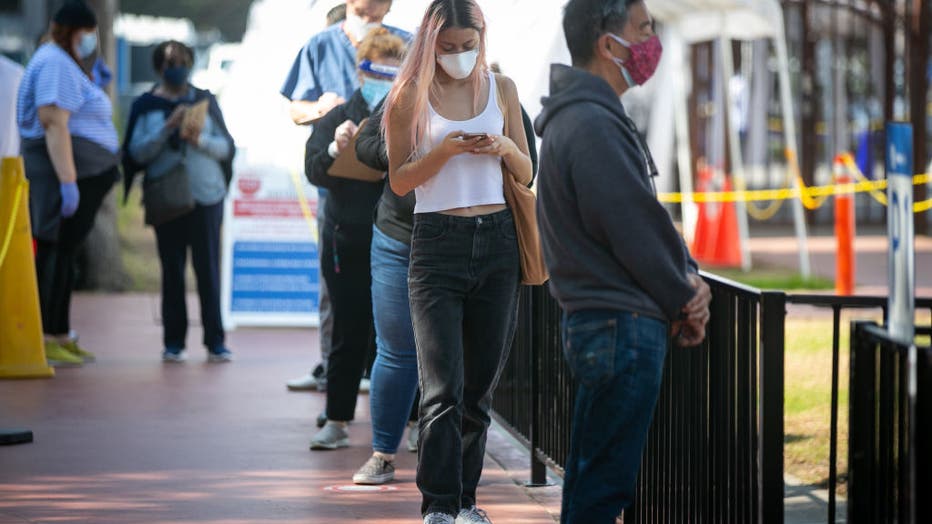California, New York coronavirus variants: Researchers tracking spread of new strains
LOS ANGELES - Worrisome new variants of the coronavirus have been detected in both California and New York and are spreading rapidly, according to researchers — fueling concerns that emerging and possibly more contagious strains could hinder the recent downward trend of cases in the country.
One variant in New York City, called B.1.526, was first detected in late November 2020. By mid-February, it appeared in roughly 25% of the coronavirus genomes sequenced and entered into a database shared by researchers.
Information about B.1.526 was shared in a pair of recent studies that have yet to be peer-reviewed.
One study, published Feb. 23 and led by a team at Caltech, found two versions of the B.1.526 variant — including one with the E484K mutation that appears to help the virus slip past the body’s immune response. Another version includes a mutation called S477N, which may allow the virus to bind more tightly to human cells.
A second study, published Feb. 25 by researchers at Columbia University, analyzed 1,142 samples from patients at the university’s medical center.
They found a "steady increase" in the detection of the B.1.526 variant that contains the E484K mutation from late December to mid-February, "with an alarming rise to 12.3% in the past two weeks." Patients infected with the variant carrying that mutation were about six years older, on average, and more frequently hospitalized.
RELATED: Researchers concerned ‘escape mutation’ found in COVID-19 variants may help virus evade antibodies
On the opposite coast, a new coronavirus variant has also been detected in Southern California amid a surge in local infections and has been spreading rapidly, according to research published Feb. 11 in the JAMA medical journal.
The variant, called CAL.20C, was first detected in July 2020 in 1 out of 1,247 samples from Los Angeles County. Researchers said it wasn’t detected in Southern California again until October. Since then, the prevalence of CAL.20C has increased throughout the state — accounting for 35% of all samples collected in late January, and 44% of all samples collected from Southern California counties, specifically.

FILE - People line up for their turn at receiving the COVID-19 vaccine at Kedren Health on Feb. 11, 2021 in Los Angeles, California. (Jason Armond / Los Angeles Times via Getty Images)
The California variant also contains mutations in the spike protein, similar to other new strains, which may the virus to bind easier to human cells, researchers said.
How infectious the variant is or how likely it is to cause severe disease remains unknown. "Nevertheless, the identification of this novel strain is important to frontline and global surveillance of this evolving virus," researchers wrote.
RELATED: LA County reports sharp drop in new COVID-19 hospitalizations
Viruses constantly mutate as they spread, and most changes aren’t significant. But there are other concerning variants spreading throughout the U.S. and around the world, including those originally detected in South Africa, the U.K. and Brazil.
First-generation COVID-19 vaccines appear to be working against today’s variants, but makers already are taking steps to tweak their shots if needed. And experts say the mRNA vaccines currently being used in the U.S. by Pfizer and Moderna are easy to update.
The mRNA vaccines use a piece of genetic code for the spike protein that coats the coronavirus, so the body’s immune system can learn to recognize and fight the real thing. If a variant with a mutated spike protein crops up that the original vaccine can’t recognize, companies would swap out that piece of genetic code for a better match — if and when regulators decide that’s necessary.
RELATED: How would vaccine makers adapt to COVID-19 variants?
The number of new cases have been trending downward across the U.S. as more people are vaccinated, including in California — which suffered a devastating surge in COVID-19 cases, hospitalization and deaths over the holiday season.
But as President Joe Biden marked the 50 millionth dose of COVID-19 vaccine since his swearing-in, he warned that variants could continue to spread and lead to more cases and hospitalizations.
"This is not the time to relax," Biden said Thursday.
RELATED: Biden marks 50 million COVID-19 vaccine doses in first 5 weeks in office
This story was reported from Cincinnati. The Associated Press contributed.



